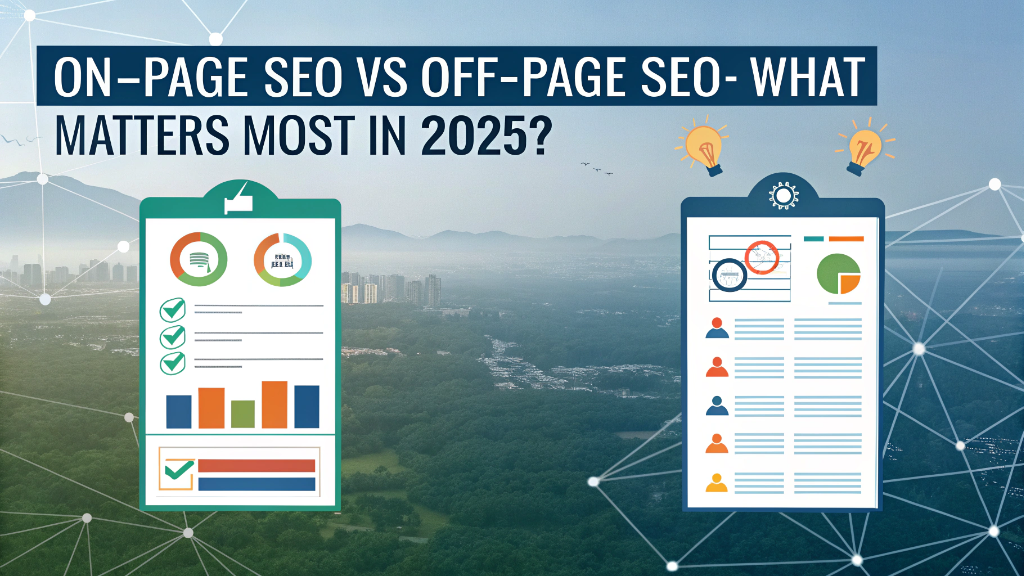I'm always excited to take on new projects and collaborate with innovative minds.
+21623776423
I'm always excited to take on new projects and collaborate with innovative minds.
+21623776423
drives more traffic than paid advertising?

Did you know that 75% of marketers say SEO drives more traffic than paid advertising? Yet, with Google’s algorithms evolving faster than ever, the age-old debate rages on: Is on-page SEO or off-page SEO more critical for ranking success in 2025? The answer isn’t as simple as choosing one over the other—it’s about understanding the key differences between on-page and off-page SEO and how each impacts your website’s visibility, authority, and long-term growth.
In this guide, we’ll break down both strategies with fresh data, actionable insights, and a dash of future-gazing to help you prioritize your efforts. Whether you’re a seasoned SEO pro or just starting out, you’ll walk away with a clear roadmap to dominate search engines in 2025 and beyond.
Think of SEO like baking a cake: You need the right mix of ingredients to achieve the perfect result. Here’s what you’ll need to rank higher, attract more traffic, and convert visitors into loyal customers:
Substitutions: No SEMrush? Try Ubersuggest. Short on time? Prioritize long-tail keywords over exhaustive research.
SEO isn’t a microwave meal—it’s a slow cooker. Here’s how long each strategy takes to yield results:
Pro Tip: Combine both strategies for a 20% faster ROI, according to a 2024 HubSpot study.
Start by diagnosing your site’s health. Use tools like Screaming Frog to crawl for broken links, duplicate content, or missing meta tags. Fixing these issues is like preheating your oven—it sets the stage for success.
Google’s 2025 algorithms will prioritize user satisfaction over keyword density. Create content that solves problems, like detailed guides or comparison reviews. Use tools like AnswerThePublic to uncover FAQs in your niche.
Instead of cold-emailing for links, network with influencers on LinkedIn or Twitter. Offer value first—share their content, comment thoughtfully, then pitch collaboration ideas.
SEO is dynamic. Use Google Search Console to track rankings and adjust your strategy monthly. If a blog post isn’t ranking, tweak its headers or add fresh statistics.
Investing in SEO delivers long-term benefits:
Not all websites need the same SEO diet:
Once your SEO efforts pay off, showcase them:
The truth is, on-page and off-page SEO are two halves of a whole. While on-page SEO ensures your website is technically sound and user-friendly, off-page SEO builds the authority that Google loves. In 2025, the winners will be those who master both—creating exceptional content and cultivating a powerful backlink profile.
Ready to put this into action? Start by auditing your site today, then build a 12-month SEO plan that blends both strategies. And don’t forget to share your results in the comments—we’d love to hear what works for you!
Q: Which is more important for new websites: on-page or off-page SEO?
A: Focus 70% on on-page SEO first—without a solid foundation, backlinks won’t have the same impact.
Q: Can social media replace off-page SEO?
A: No, but it complements it. Social signals boost visibility, while backlinks build authority.
Q: How often should I update my content for SEO?
A: Audit top-performing pages every 3–6 months. Add new data, examples, or multimedia to keep them fresh.
Q: Are backlinks still relevant in 2025?
A: Absolutely! Google’s Gary Illyes confirmed in 2024 that backlinks remain a top-3 ranking factor.
Q: What’s the fastest way to improve rankings?
A: Fix technical issues first (like site speed), then optimize content for user intent.
Your email address will not be published. Required fields are marked *